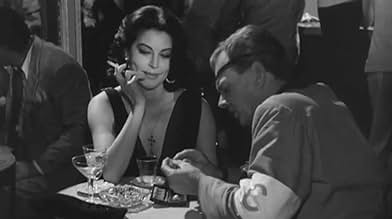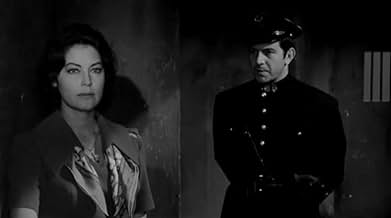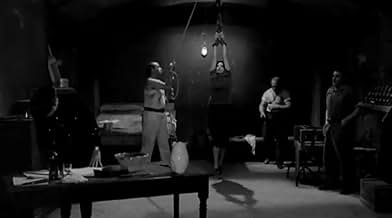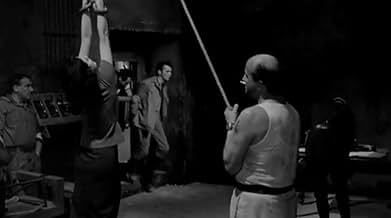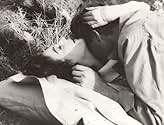Father Arturo Carrera leaves the priesthood over the church's indifferent position during the Spanish Civil War, but finds himself attracted to beautiful entertainer Soledad.Father Arturo Carrera leaves the priesthood over the church's indifferent position during the Spanish Civil War, but finds himself attracted to beautiful entertainer Soledad.Father Arturo Carrera leaves the priesthood over the church's indifferent position during the Spanish Civil War, but finds himself attracted to beautiful entertainer Soledad.
- Director
- Writers
- Stars
Robert Bright
- Father Idelfonso
- (uncredited)
Franco Castellani
- José
- (uncredited)
Nino Castelnuovo
- Capt. Trinidad
- (uncredited)
Robert Cunningham
- Mac
- (uncredited)
Gustavo De Nardo
- Maj. Garcia
- (uncredited)
Franco Fantasia
- Cabaret Customer
- (uncredited)
Armando Fracassi
- Nationalist Prisoner
- (uncredited)
- Director
- Writers
- All cast & crew
- Production, box office & more at IMDbPro
Featured reviews
The Angel Wore Red is one of the few films in the English speaking world that
deals with the Spanish Civil War. It takes an even handed approach to the
conflict as well.
The military high command in the Spanish Republic withdrew its support from the civil government that came into power after the Spanish monarchy was overthrown in 1931. The Nationalist had disciplined troops and the backing of the Catholic Church. The Republican government cobbled together an army and it fought as best it could from 1936 to 1939.
Dirk Bogarde decides to leave the church at the worst possible time when the city he was posted to is under siege. Those left wing folks occupying the city were very anti-Catholic and they were rounding up priests as spies for the Nationalists. When the Nationalists take the city he's got a problem with them in that they don't quite buy him either. The only one who seems to get him is Ava Gardner playing a bar entertainer who gets by the best she can. When you've been celibate you can imagine how intense it must have been.
There's also a religious relic that the church has, a drop of blood from St.John the Divine. Both sides want to possess it.
This tale is told from neutral correspondent Joseph Cotten who with his eye patch is modeled on Floyd Gibbons. He's quite cynical about the war and is not believing all the fuss about this religious relic. But the phenomenon is there for him to report.
According to Lee Server's biography of Ava Gardner, both she and Bogarde were most dissatisfied with how MGM distributed the film. Both felt they did good work and they did and wished more had seen the film.
It's something you should see if you can.
The military high command in the Spanish Republic withdrew its support from the civil government that came into power after the Spanish monarchy was overthrown in 1931. The Nationalist had disciplined troops and the backing of the Catholic Church. The Republican government cobbled together an army and it fought as best it could from 1936 to 1939.
Dirk Bogarde decides to leave the church at the worst possible time when the city he was posted to is under siege. Those left wing folks occupying the city were very anti-Catholic and they were rounding up priests as spies for the Nationalists. When the Nationalists take the city he's got a problem with them in that they don't quite buy him either. The only one who seems to get him is Ava Gardner playing a bar entertainer who gets by the best she can. When you've been celibate you can imagine how intense it must have been.
There's also a religious relic that the church has, a drop of blood from St.John the Divine. Both sides want to possess it.
This tale is told from neutral correspondent Joseph Cotten who with his eye patch is modeled on Floyd Gibbons. He's quite cynical about the war and is not believing all the fuss about this religious relic. But the phenomenon is there for him to report.
According to Lee Server's biography of Ava Gardner, both she and Bogarde were most dissatisfied with how MGM distributed the film. Both felt they did good work and they did and wished more had seen the film.
It's something you should see if you can.
I thought this film was rather lacking in both narrative and film-making technique. The script is far from awful, but also far from interesting in the most part. As the previous reviewer says, the lighting, choice of shots etc. was jarring and obscured characters (Joseph Cotten, who indeed established no presence at all in this film partly due to this). The historical period examined is a curious if comendable choice, and while the general details are correctly conveyed, no attempt is really made to discuss the issues in much depth. Good to see neither of the two sides particularly favoured, although such a commitment might have added at least some drama. Drama is scant in the film, with a few scenes written as exposition, delivered in a way just as stilted.
The film actually has a rather good and eclectic cast for 1960, although the talents are ill used. Finlay Currie, Vittorio De Sica (well, seemingly in the main part a director), Dirk Bogarde (not yet of the stature achieved in films like "The Servant" and "Accident"), Joseph Cotten and Ava Gardner are all of some talent. De Sica's character who does indeed speak in a rather un-Italian, mid-Atlantic accent, which either suggests dubbing or a remarkably odd decision somewhere along the line - the character is portrayed as a Spanish patriot. The character's endless minor disparaging comments about modern warfare are mildly amusing in their frequency. I wouldn't say Ava Gardner is at all "past her prime" in this film, at about 37. Her performance is actually quite good, although lacking some credibility, and there are some pretty reasonable quiet scenes between her and Bogarde. Her beauty seems to have matured well, although the murky, technically below-par direction doesn't help this to show. Bogarde seemed quite good at times, but far from indelible or memorable in this role.
I would say this film is reasonably watchable and far from abject, but it is largely far from gripping or interesting.
Rating:- **/*****
The film actually has a rather good and eclectic cast for 1960, although the talents are ill used. Finlay Currie, Vittorio De Sica (well, seemingly in the main part a director), Dirk Bogarde (not yet of the stature achieved in films like "The Servant" and "Accident"), Joseph Cotten and Ava Gardner are all of some talent. De Sica's character who does indeed speak in a rather un-Italian, mid-Atlantic accent, which either suggests dubbing or a remarkably odd decision somewhere along the line - the character is portrayed as a Spanish patriot. The character's endless minor disparaging comments about modern warfare are mildly amusing in their frequency. I wouldn't say Ava Gardner is at all "past her prime" in this film, at about 37. Her performance is actually quite good, although lacking some credibility, and there are some pretty reasonable quiet scenes between her and Bogarde. Her beauty seems to have matured well, although the murky, technically below-par direction doesn't help this to show. Bogarde seemed quite good at times, but far from indelible or memorable in this role.
I would say this film is reasonably watchable and far from abject, but it is largely far from gripping or interesting.
Rating:- **/*****
Despite some obvious flaws I regard this film as a major achievement. The first obvious problem is the dubbing. Vittorio De Sica, a great actor is dubbed in English by a run of the mill voice over technician. The film suffers from being a joint Anglo/American- Italian production.
But it is one of the most mature treatments of a political historical theme that I have ever seen. Neither the loyalists nor the Franco led rebels are spared. Both are essentially brutal totalitarians. The Catholic Church is not spared either. Churchmen are showed to be so out of touch with their flock as to be almost comical, and yet when finally knocked off their pedestal they recover their Christianity. Dirk Bogard gives a subtle and brilliant performance as the tortured young priest. Ava Gardner is perfect as the cynical and yet innocent prostitute. It is actually to her advantage that she played this role at 37 rather than ten years earlier. She would simply been too overpoweringly beautiful to have been fully creditable in the part. Aldo Frabrizzi's part may be too reminiscent of his role in Open City especially at the end. Vittorio De Sica seems to have been doing an imitation of Claude Raines in Casablanca. It would have been good to have heard those two great actors in their native Italian. Joseph Cotton as the one eyed jaded reporter gives a broad yet compelling interpretation. The films failings pale in comparison to its overriding importance.
But it is one of the most mature treatments of a political historical theme that I have ever seen. Neither the loyalists nor the Franco led rebels are spared. Both are essentially brutal totalitarians. The Catholic Church is not spared either. Churchmen are showed to be so out of touch with their flock as to be almost comical, and yet when finally knocked off their pedestal they recover their Christianity. Dirk Bogard gives a subtle and brilliant performance as the tortured young priest. Ava Gardner is perfect as the cynical and yet innocent prostitute. It is actually to her advantage that she played this role at 37 rather than ten years earlier. She would simply been too overpoweringly beautiful to have been fully creditable in the part. Aldo Frabrizzi's part may be too reminiscent of his role in Open City especially at the end. Vittorio De Sica seems to have been doing an imitation of Claude Raines in Casablanca. It would have been good to have heard those two great actors in their native Italian. Joseph Cotton as the one eyed jaded reporter gives a broad yet compelling interpretation. The films failings pale in comparison to its overriding importance.
10clanciai
This is a fascinating story with many aspects and undertones of fathomless depth and a very different view of the Spanish civil war than what is usually represented. The drama grips you at once, as the young priest leaves the church demonstratively in protest, which immediately throws you into an interesting development of character and events, as the civil war breaks out. Joseph Cotten is an American journalist who gives the drama a form, but Ava Gardner is the central figure, 'the angel in red', a prostitute in a night club which the unfrocked priest finds himself at home in. Another character is Aldo Fabrizi, who here repeats his martyrdom from "Rome, open city" as the carrier of the one holy thing still remaining as a hope for the people, a relic with a drop of a saint's blood with apparently tremendous national meaning to both believers and non-believers. On top of it all there is Vittorio de Sica as the general who better than anyone else sees through the utter absurdity and madness of this civil war.
It is possibly the best film of the Spanish civil war that has been made, in spite of its foibles, as it presents a fairer and broader insight into the war than any other film I have seen on this bloody mess, which almost went on from 1936 until the year of the second world war, as an introduction. The love story is totally convincing and 'organic', as Polanski would have said, but the pathos of the film is tremendous, almost giving a documentary presentation of the war but from below, from the view of common people, a prostitute, a defrocked priest and innocent victims. It's like one of Graham Greene's best novels, but the music adds an extra dimension of beauty and infinite suffering and sorrow as well, like to the shocking war pictures of Goya. It's a great film, it can't be denied, and its lacks and wants are not enough to reduce anything of its deeply human and fascinating greatness.
It is possibly the best film of the Spanish civil war that has been made, in spite of its foibles, as it presents a fairer and broader insight into the war than any other film I have seen on this bloody mess, which almost went on from 1936 until the year of the second world war, as an introduction. The love story is totally convincing and 'organic', as Polanski would have said, but the pathos of the film is tremendous, almost giving a documentary presentation of the war but from below, from the view of common people, a prostitute, a defrocked priest and innocent victims. It's like one of Graham Greene's best novels, but the music adds an extra dimension of beauty and infinite suffering and sorrow as well, like to the shocking war pictures of Goya. It's a great film, it can't be denied, and its lacks and wants are not enough to reduce anything of its deeply human and fascinating greatness.
This film has an abiding place in my film canon, for one very good reason.
It isn't a great film, as both the other IMDb reviewers have gone out of their way to stress (although some of their criticisms were a little unfair. I thought, for example, that Joseph Cotten fared better than they say). However, it is virtually the only entertainment vehicle I have ever seen - including film, TV, radio, newspaper, magazine - that dares to show the truth about the left-wing Republicans/anti-Nationalists in the Spanish Civil War.
The Spanish Republicans have been lionised for decades for their allegedly heroic struggle against fascism (although it is actually a moot point to what extent Franco's Nationalists were fascist). However, this film is brave enough to show the truth - that the Spanish Republicans singled out religious targets and many harmless middle class targets and killed or persecuted them. It also dares to show the truth that the Republicans ran the areas they controlled along Stalinist lines. Which is not surprising, given the links with Communists and Stalinist Russia that some of them had.
The file deserves enormous credit for showing this, and it is a shame that no-one has pointed this out on IMDb - until now.
It isn't a great film, as both the other IMDb reviewers have gone out of their way to stress (although some of their criticisms were a little unfair. I thought, for example, that Joseph Cotten fared better than they say). However, it is virtually the only entertainment vehicle I have ever seen - including film, TV, radio, newspaper, magazine - that dares to show the truth about the left-wing Republicans/anti-Nationalists in the Spanish Civil War.
The Spanish Republicans have been lionised for decades for their allegedly heroic struggle against fascism (although it is actually a moot point to what extent Franco's Nationalists were fascist). However, this film is brave enough to show the truth - that the Spanish Republicans singled out religious targets and many harmless middle class targets and killed or persecuted them. It also dares to show the truth that the Republicans ran the areas they controlled along Stalinist lines. Which is not surprising, given the links with Communists and Stalinist Russia that some of them had.
The file deserves enormous credit for showing this, and it is a shame that no-one has pointed this out on IMDb - until now.
Did you know
- TriviaThe film was originally planned to be shot on-location in Spain. However, due to the unflattering portrayal of Nationalists in the Spanish Civil War, the Franco regime declined permission.
- GoofsWhen the prisoners are being marched for several days to be presented to the fascists, the group contains a substantial number of women. At least two women are shown confessing to Arturo. But when the fascists capture the group, Arturo tells the commander that the group consists of 200 men who should not be killed, no mention of women. When Arturo enters the church to tell the prisoners they are to be executed, the group is all men. The women have vanished.
- ConnectionsFeatured in Best in Action: 1960 (2018)
- How long is The Angel Wore Red?Powered by Alexa
Details
Box office
- Budget
- $1,843,000 (estimated)
- Runtime
- 1h 39m(99 min)
- Color
- Aspect ratio
- 1.85 : 1
Contribute to this page
Suggest an edit or add missing content


